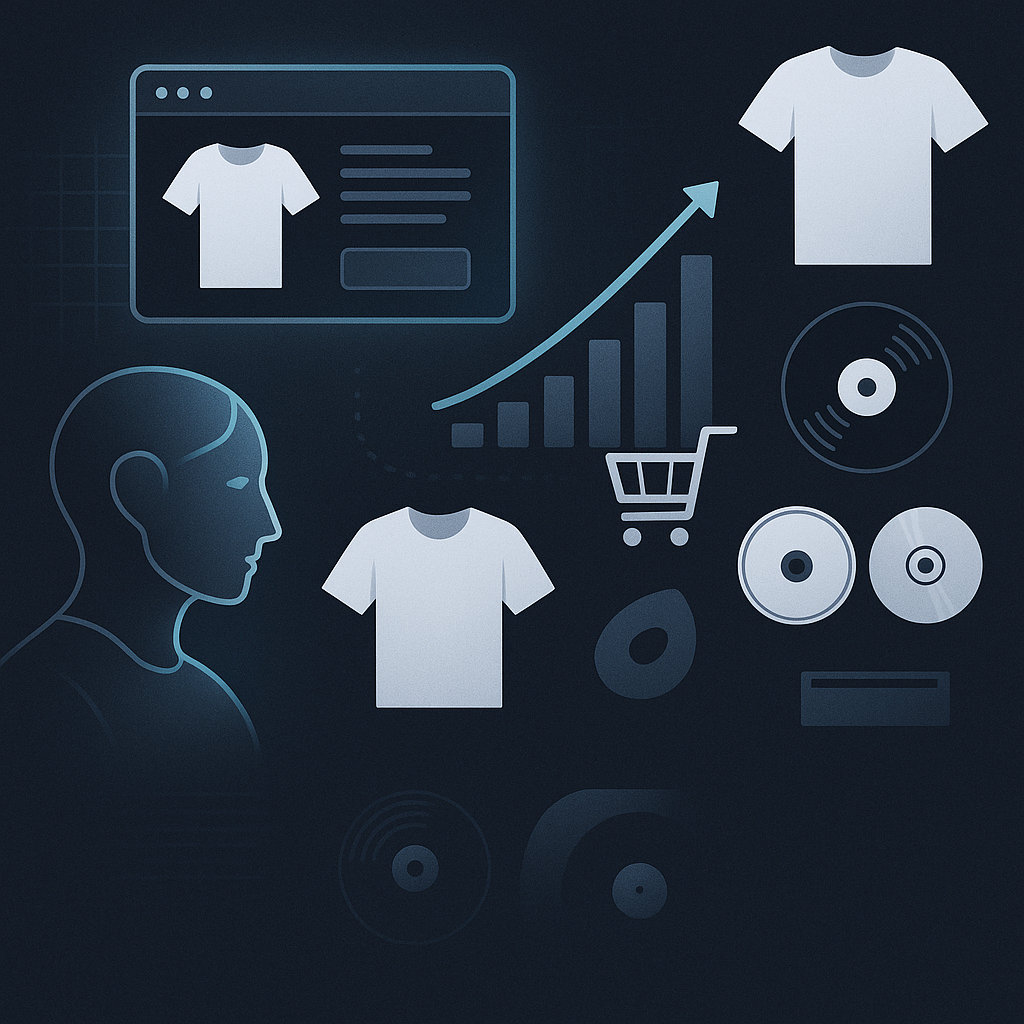Reactions to Shopify’s Connect to Consumer Editions - New Products Rollout - Summer 2022
June 23, 2022

Shopify recently launched a collection of significant product updates across their platform. We were early adopters of Shopify. I began using Shopify for music industry clients like Ice Cube, Alicia Keys, Eminem, and Lady Gaga starting in 2011 and have used it ever since. Shopify is the most tech-forward commerce platform available, and Mainfactor utilizes it as the foundation for many e-commerce shops. Here are our reactions to Shopify’s latest rollout:
- Twitter Shopping. Twitter is one of the most actively utilized social media platforms for artists, celebrities, and brands. Given the amount of engagement a brand can drive with Twitter, it makes sense that Twitter and Shopify finally connected to drive native commerce functionality. With Twitter commerce, you can sell products right from your Twitter profile. We believe this is now a useful and important piece of managing a comprehensive multi-channel commerce ecosystem.
- Marketplace Kit. At Mainfactor, we are big proponents of leveraging omnichannel commerce, with Shopify as the backbone. Marketplace kit, along with Shppify’s marketplace API connections, makes the third party commerce portion of an omnichannel commerce presence easier and more efficient to integrate and manage. Want your products across Spotify, Google Shopping, Meta/Facebook Shop, Lyst, TikTok, and Shopify’s Shop app? Marketplace kit and Shopify’s marketplace tools and connections make this possible.
- Linkpop. “Link in Bio” is typically not the most seamless experience for a consumer, especially if the link only goes to one page when you are really trying to promote several products that live on different pages within your site. With LinkPop (also see LinkTree and LinkFire), you can make your Link in Bio a great consumer experience, with links to your various properties and featured products, all in one place. Integrating Linkpop increases conversions from your link in bio by 2x. With social commerce on the rise, it is important to streamline landing pages, and with “Link in Bio” being a built-in function to Instagram engagement, we think this is a useful tool to optimize relevant landing page experiences.
- Shopify Point of Sale. We cannot be proponents of omnichannel commerce without figuring out how to integrate brick and mortar retail into our strategy. That is where Shopify Point of Sale comes in. With Shopify POS, Mainfactor becomes a retailer of record for our clients for tour merchandise, events, and pop-ups. With Shopify POS you can accept major credit cards on a portable card machine at your live events, accept payment with Tap to Pay on iPhone, sync inventory with your e-commerce shop, and set up multiple locations to sell products from. If Shopify is the backbone of your online commerce, Shopify POS extends that foundation to the real world. If your physical retail store is the backbone of your business, Shopify POS and the connection to a Shopify back-end creates a powerful connection to your e-commerce presence. We believe in unifying consumer data to optimize marketing, consumer experience, and to create efficient operations for retailers; Shopify POS is an important piece of that puzzle.
- B2B on Shopify. Shopify is most known for being a D2C platform, but what about B2B? There is no reason B2B shouldn’t be a part of your e-commerce stack. That is why Shopify implemented specific B2B functionality for Shopify Plus users. With Shopify B2B, you can set wholesale pricing and payment terms, create customized designs, and offer bespoke discount offers.
- Shopify Markets. Selling products internationally? Why not sell it the way people in a certain region want to see it? Shopify Markets create a simpler process for international commerce, and optimizes the consumer experience region-by-region. You can set pricing by market, sell in specific currencies and languages, and collect duties and import at checkout.
- Shopify Checkout and Shop Pay. Amazon made shopping online easier than ever with their one-click checkout functionality. Shop Pay and Shopify checkout both aim to provide the same level of consumer-ease on any Shopify store experience, and as Shopify collects an increasing amount of user data into their payments funnel, it becomes more powerful for online retailers. Leveraging Shop Pay on a Shopify store turns visitors into purchasers at a “70% higher checkout-to-order rate than any standard checkout.” It also optimizes the speed of checkout by 4x. With Shopify Plus, you can also extend the checkout experience for consumers by adding native-upsell for an increased AOV, and other cart customizations. Shop pay also now includes built-in fraud protection, and buy now/ pay later options. The buy now/pay later functionality will also help increase your AOV.
- Discount Combinations. This one is big. Finally, you can now allow consumers to leverage multiple discount codes in a single cart experience. Just make sure you manage your codes and are aware of what offers are available to consumers!
- Pre-Order Functionality. Mainfactor manages many pre-orders for our music clients, as it is one of the best ways to pre-market and hype an album release, while also maximizing merchandise revenue prior to a release. Now Shopify has rolled-out more functionality through preferred and vetted third party Shopify apps, built specifically for offering and managing pre-orders.
- Hydrogen + Oxygen and Headless Commerce. Do you want more native shopping integrated into a broader content or site experience. Shopify now enables headless commerce for flexible commerce experiences across multiple platform integration capabilities.
- Tokengated Commerce. You can now mint and offer NFTs through your Shopify store, and gate your shop or a product with a token. Consumers can link their crypto wallet to a Shop, and through purchasing NFTs, they can access content, early access, and products only accessible behind a tokengate. This rollout extends your e-commerce presence into the web3 world and opens up an entirely new line of product capabilities, loyalty functionalities, and up-sell potential. We plan to utilize this regularly as NFTs become a more common product across the entertainment industry and e-commerce presences.
- Themes, Metafields, and Search. Shopify continues to expand upon its robust library of available themes. You can essentially find any look and feel needed and then customize from there. The metafields feature allows bespoke tagging and tracking for products, categories, and consumer data; these robust data entry and tracking capabilities create new opportunities for merchandising your site, and tracking specific data. Shopify also rolled out a more robust search and discovery feature, making it easier than ever to implement a comprehensive search function on your site, so consumers can find the products they are looking for efficiently.
- Shopify Audiences - You can store a significant amount of valuable data within a Shopify back-end. With Shopify Audiences, you can create and export this valuable data into advertising platforms like Facebook and Google to utilize for digital ad targeting. This is an amazing use-case for the treasure trove of data you’re sitting on within your Shopify store. Shopify Audiences will enable a smaller online business to market like a larger, complex digital infrastructure, with automated and highly tailored proprietary data feeding platforms and targeting. Implementing Shopify Audiences will enable you to create smart audiences, leverage machine learning, drive higher conversion rates, and to create higher performing ads.
- New Customer Engagement Tools. Shopify was previously viewed as solely a commerce tool, but it is increasingly becoming a robust marketing tool. While we love Klaviyo and some of the other third party applications, it is nice to think about managing CRM, customer segmentation, and email marketing automations all from within Shopify. It is becoming a reality, watch this space.
- Shopify Flow. As e-commerce expands as a primary sales channel for retailers, artists, creators, and brands, the management of it becomes more complex. Shopify has built Shopify Flow to enable automations for setting up and managing your commerce operations. You can automate tasks and create automated workflows across functions like inventory management, fraud review, and marketing campaigns.
- Shopify Planet. Last but absolutely not least, this is an amazing update right from Shopify. With Planet, a donation is triggered on each and every order to make it carbon neutral, and the application has a dashboard to show your impact over time.
See all of these recent updates and more from Shopify Here.
There is even more than that, but those are the recent updates from Shopify that we found most relevant (for now). Please reach out to us if you have any questions or would like to discuss any of these awesome updates!
Contact Us








